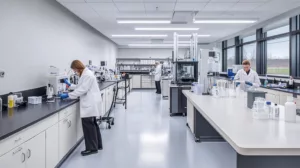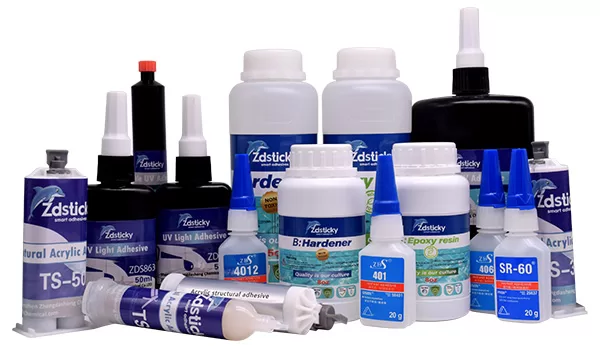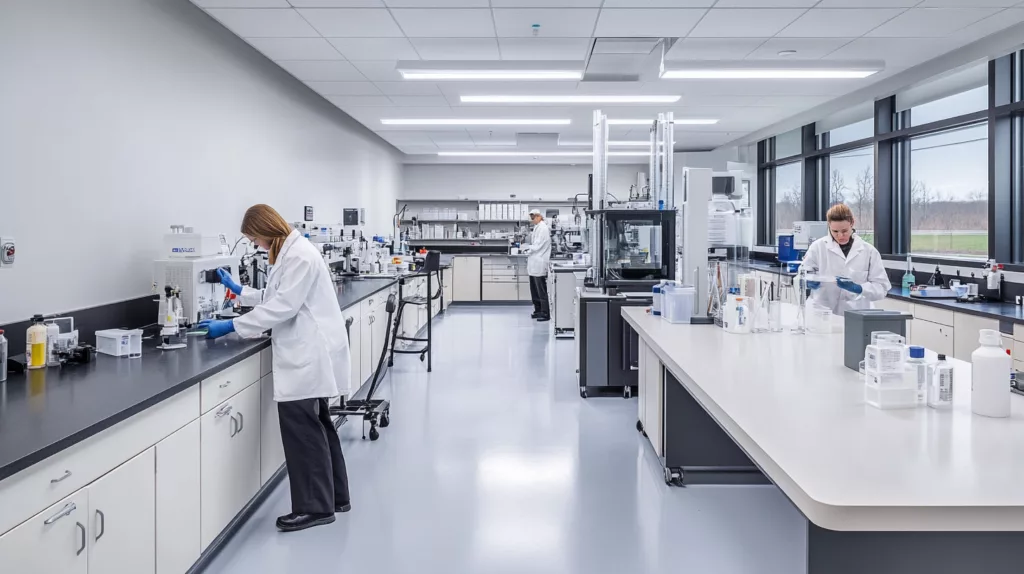Medical-grade adhesives are indispensable in modern healthcare. These specialized bonding agents offer unmatched performance, safety, and biocompatibility for medical applications, from wound care to advanced medical devices. By adhering to strict standards, they ensure patient safety and operational efficiency.
This article explores the types, benefits, applications, and innovations surrounding medical-grade adhesives. Whether you’re in the medical field or curious about their significance, you’ll find all the answers here.
What are Medical Grade Adhesives?
Medical grade adhesives are bonding agents specifically designed for healthcare and medical applications. They comply with stringent medical standards, ensuring biocompatibility, sterilization resistance, and long-term durability. These adhesives are used to bond medical devices, secure dressings, or provide temporary and permanent adhesion in surgical and therapeutic applications.
Unlike standard adhesives, medical-grade options undergo rigorous testing to ensure they meet safety and performance benchmarks set by organizations such as the FDA and ISO 10993 standards.
Why Are Medical Grade Adhesives Important in Healthcare?
Medical-grade adhesives play a critical role in healthcare for numerous reasons:
- Biocompatibility: They are safe for contact with the human body without causing irritation or toxicity.
- Reliability: These adhesives perform well under challenging conditions, such as exposure to moisture, temperature changes, and sterilization processes.
- Flexibility: They can bond a wide range of medical materials, including plastics, metals, and skin.
- Reduced Infection Risks: Proper adhesion helps secure medical dressings, reducing the chance of contaminants entering wounds.
From small adhesive bandages to complex medical equipment, medical-grade adhesives ensure safety and functionality in medical procedures.
Types of Medical Grade Adhesives
Silicone-Based Medical Adhesives
Silicone adhesives are widely used for their skin-friendly properties. They are ideal for applications requiring gentle removal, such as:
- Wound dressings
- Scar treatment
- Pediatric and geriatric care
Silicone adhesives are non-reactive and comfortable, minimizing skin damage during removal.
Acrylic-Based Medical Adhesives
Acrylic adhesives are versatile and provide long-term adhesion. They are used in:
- Surgical tapes
- Electrode fixation
- Medical device attachment
Their strong bonding capabilities make them suitable for heavy-duty and long-wear applications.
Cyanoacrylate Adhesives
Commonly known as medical “super glue,” cyanoacrylates are fast-curing adhesives used for:
- Wound closure
- Tissue bonding in surgeries
- Small medical repairs
These adhesives eliminate the need for sutures in minor wounds, providing an efficient and painless solution.
Epoxy-Based Medical Adhesives
Epoxies are used in permanent bonding for medical devices, including:
- Catheters
- Syringes
- Surgical tools
Their exceptional strength and resistance to harsh conditions make them ideal for durable medical applications.
Applications of Medical Grade Adhesives
Wound Care and Management
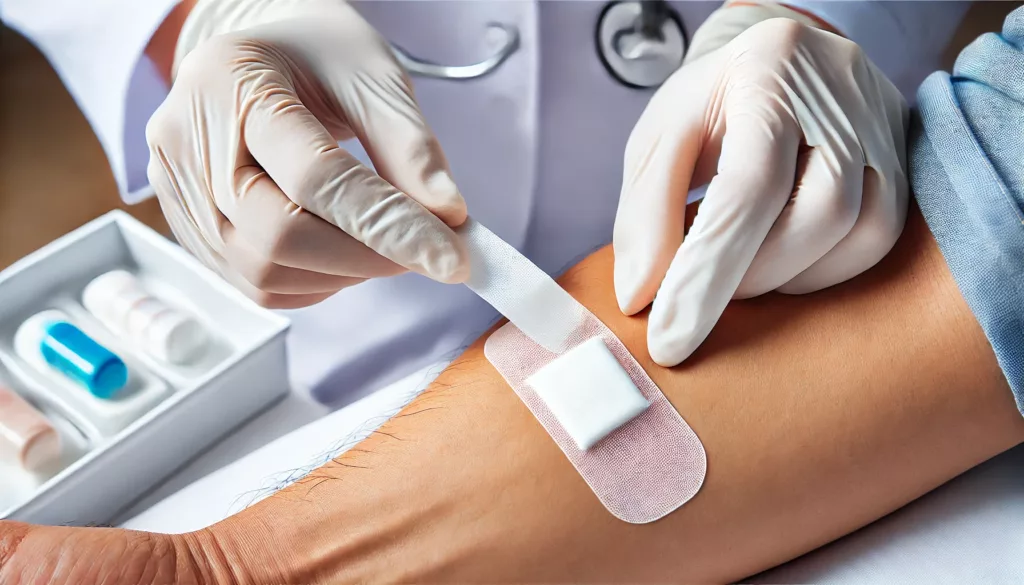
Medical-grade adhesives are essential in wound management products like bandages, films, and dressings. They ensure the dressing stays securely in place while allowing painless removal, protecting the wound from contaminants and accelerating healing.
Medical Device Assembly

Adhesives are critical in the manufacturing and assembly of medical devices, such as:
- IV tubes and catheters
- Surgical instruments
- Diagnostic equipment
Their ability to bond diverse materials with precision ensures reliable device performance.
Surgical and Tissue Bonding
In surgical procedures, adhesives like cyanoacrylate offer a non-invasive method to close wounds and incisions. These adhesives provide quick adhesion, minimize scarring, and reduce recovery times.
Wearable Medical Technology
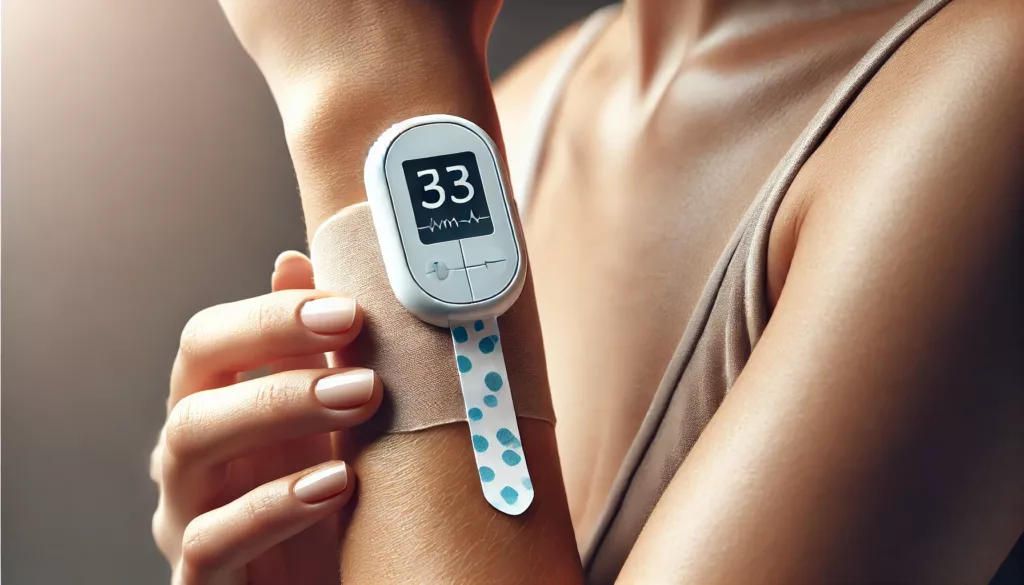
Medical-grade adhesives secure wearable healthcare devices, such as glucose monitors, EKG sensors, and activity trackers. They must provide durability, comfort, and long-lasting performance during daily activities.
Drug Delivery Systems
Adhesives are used in transdermal patches and drug delivery systems that allow medications to be absorbed through the skin. These patches ensure consistent drug delivery and improve patient compliance.
Key Benefits of Medical Grade Adhesives
Enhanced Safety
Medical adhesives are rigorously tested for biocompatibility and sterilization, ensuring they meet strict healthcare standards.
High Durability
They perform exceptionally well in challenging environments, such as moist, warm, or sterilized conditions, without degrading or losing adhesion.
Skin-Friendly
Adhesives designed for skin applications are gentle and minimize discomfort during application and removal.
Customizable Solutions
Manufacturers can tailor adhesive formulations to meet specific requirements, such as strength, flexibility, or resistance to certain chemicals.
Efficiency in Medical Processes
Medical adhesives simplify procedures by offering fast, clean, and reliable bonding alternatives compared to mechanical fasteners like sutures or staples.
Innovations in Medical Grade Adhesives
Advanced Bio-Adhesives
Bio-adhesives, derived from natural sources, mimic biological processes to provide safe and eco-friendly bonding solutions. They are particularly useful in tissue repair and wound closure.
Smart Adhesives
The rise of wearable medical devices has led to smart adhesives that monitor vitals, track medical conditions, and communicate real-time data. These adhesives combine durability with cutting-edge technology.
Anti-Microbial Adhesives
Innovations in anti-microbial adhesives help prevent infections in wound care and device applications. These adhesives release antimicrobial agents to eliminate bacteria and promote healing.
Eco-Friendly Formulations
Sustainability is becoming a focus, with eco-friendly medical-grade adhesives reducing environmental impact without compromising performance.
How to Choose the Right Medical Grade Adhesives
Selecting the correct medical-grade adhesive depends on the following factors:
- Application Requirements: Temporary vs. permanent adhesion, flexibility, and strength.
- Material Compatibility: Ensuring the adhesive bonds effectively with the target surface (e.g., skin, plastic, metal).
- Sterilization Needs: Adhesives must withstand sterilization processes like autoclaving or chemical exposure.
- Skin Sensitivity: For skin applications, choose adhesives designed to prevent irritation or damage.
- Regulatory Compliance: Verify the adhesive meets FDA and ISO medical standards.
Working closely with adhesive manufacturers ensures you select the right solution for your specific needs.
Medical Grade Adhesives in the Future
The future of medical-grade adhesives is marked by advancements in nanotechnology, bioengineering, and smart solutions. Innovations aim to improve patient care, enhance device functionality, and support minimally invasive treatments.
As healthcare technologies evolve, medical-grade adhesives will continue to play an essential role in improving safety, performance, and patient outcomes.
Frequently Asked Questions
What are medical grade adhesives used for?
Medical-grade adhesives are used for wound care, surgical procedures, medical device assembly, wearable technology, and drug delivery systems.
Are medical-grade adhesives safe for the skin?
Yes, medical-grade adhesives are rigorously tested to ensure they are biocompatible and safe for skin applications.
What is the difference between medical-grade and regular adhesives?
Medical-grade adhesives meet strict safety, sterilization, and biocompatibility standards, whereas regular adhesives are not designed for medical or healthcare use.
Can medical-grade adhesives replace sutures?
Yes, cyanoacrylate adhesives are commonly used as alternatives to sutures for minor wound closure and surgical applications.
How long do medical-grade adhesives last?
The durability of medical-grade adhesives depends on their formulation and application. Some provide temporary adhesion, while others are designed for long-term bonding.
What materials can medical-grade adhesives bond?
Medical-grade adhesives can bond a variety of materials, including skin, metals, plastics, ceramics, and medical textiles.
Conclusion
Medical-grade adhesives are transformative in healthcare, providing reliable, safe, and effective bonding solutions. Their wide-ranging applications, from wound care to medical device assembly, highlight their importance in improving patient outcomes and operational efficiency. As technology evolves, innovations in adhesives will further elevate their role in modern medicine.
Choosing the right medical-grade adhesive requires understanding application needs, material compatibility, and compliance standards. With their unmatched performance and adaptability, medical-grade adhesives will continue to drive advancements in healthcare solutions worldwide.




